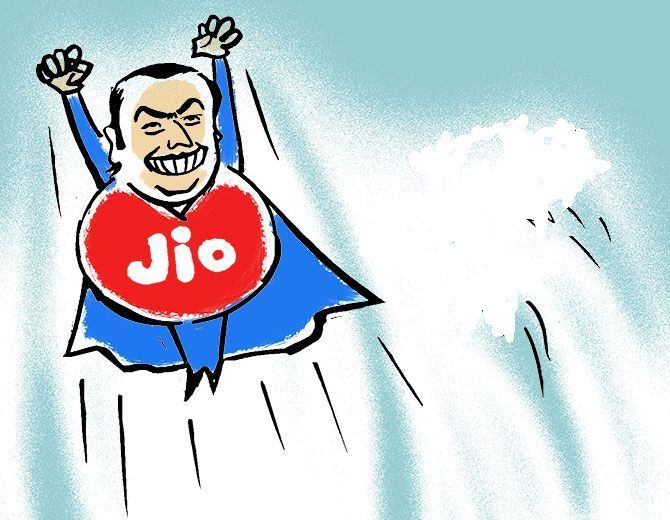Given the fragmented nature of the domestic cable TV market and the need for last-mile connectivity, RIL, said sources, would have to do more to achieve its target of reaching 20 million homes and 15 million business establishments with its broadband services across 1,600 towns in the next few years.
Illustration: Dominic Xavier/Rediff.com

Reliance Industries (RIL), which will commercially roll out its fibre-to-the-home broadband network under JioFiber next month, may consider buying more cable companies to support its plans, people in the know have told Business Standard.
The option of partnership with cable companies is also on the table, they said, as RIL looks to disrupt the broadband market like it did in telecom three years ago.
On Monday, RIL chairman Mukesh Ambani said his firm was open to partnering local cable operators (LCOs) as it sought to widen its reach for broadband services.
“Either you collaborate or you acquire. There are 100,000 LCOs in India and nearly 1,100 multi-system operators (MSOs), which are basically aggregators.
"To achieve last-mile connectivity, RIL may have to speak to these MSOs, like it did with Hathway and Den last year,” said a top media industry official privy to the developments.
An email sent to RIL remained unanswered till the time of going to press.
But people in the know said RIL was talking to regional MSOs for a collaboration or acquisition to accelerate its broadband plans, which include subscription packages ranging between Rs 700 and Rs 10,000 a month.
Last year, RIL acquired controlling stakes in Hathway Cable and Datacom, and Den Networks for Rs 5,230 crore.
The deal also triggered mandatory open offers in Hathway subsidiaries GTPL Hathway and Hathway Bhawani Cabletel.
The transactions had given RIL access to 30,000 last-mile cable operators across Den, Hathway and GTPL.
But given the fragmented nature of the domestic cable TV market and the need for last-mile connectivity, RIL, said sources, would have to do more to achieve its target of reaching 20 million homes and 15 million business establishments with its broadband services across 1,600 towns in the next few years.
At the time of acquisition last year, Hathway and Den together had access to 24 million cable-connected homes, RIL had said.
But broadband subscribers of the two players, according to their June quarter investor updates, were under a million.
The domestic market for fixed-line broadband itself is only 18.42 million, according to the Telecom Regulatory Authority of India’s (Trai’s) Performance Indicator Report for the March 2019 quarter, dominated by a cross-spectrum of players, including telecom operators such as BSNL and Airtel at one end, pure-play broadband operators or internet service providers on the other.
RIL, therefore, has its task cut out, say experts, to both grow the market for fixed broadband in India and improve its own market share.
Ambani had said his company proposed to help LCOs by giving them Jio set-top boxes that could accept both cable TV signals and broadband services.
“We have designed our Jio set-top box to accept broadcast cable TV signals from our LCO partners apart from the digital and broadband services that we will offer.
"This way, our LCO partners will continue to have a steady stream of revenue for their broadcast TV business from every JioFiber home,” he said.
But experts say tying up with or acquiring MSOs would be a faster and better way to achieve last-mile connectivity.
“The MSO base is lower than the LCO base,” said Deven Choksey, managing director, KR Choksey Investment Managers.
“That is an advantage for RIL. Second, the acquisition of an MSO will mean that RIL will get a ready base of LCOs, which is again a plus,” he said.
According to Trai, the country’s top 15 MSOs, including names such as Siti Networks, Den, Hathway, GTPL, IndusInd Media, Kal Cables (from SUN TV) and Asianet, enjoyed 78 per cent share of the cable TV market, with smaller MSOs making up the rest.
The active subscriber base of the top 15 MSOs stood at 52.33 million at the start of fiscal 2020, said Trai, with the number likely to grow in the future.












 © 2025
© 2025